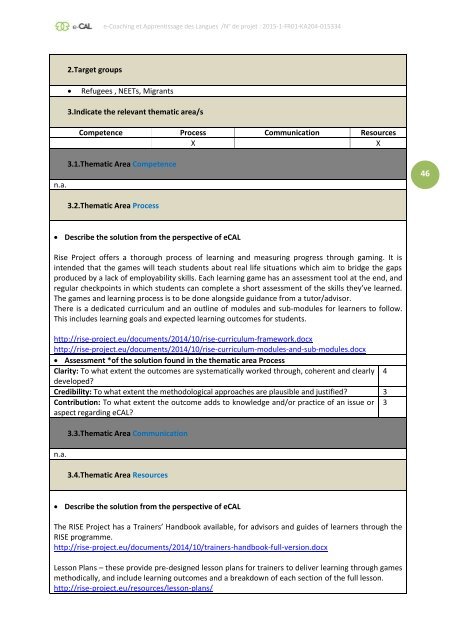e-CAL - e-Coaching et Apprentissage des Langues
The ERASMUS+ project e-CAL presents the result of an analysis of support methods in the case of language learning using web-based Open Educational Resources (OER).
The ERASMUS+ project e-CAL presents the result of an analysis of support methods in the case of language learning using web-based Open Educational Resources (OER).
Create successful ePaper yourself
Turn your PDF publications into a flip-book with our unique Google optimized e-Paper software.
e-<strong>Coaching</strong> <strong>et</strong> <strong>Apprentissage</strong> <strong>des</strong> <strong>Langues</strong> /N° de proj<strong>et</strong> : 2015-1-FR01-KA204-015334<br />
2.Targ<strong>et</strong> groups<br />
<br />
Refugees , NEETs, Migrants<br />
3.Indicate the relevant thematic area/s<br />
Comp<strong>et</strong>ence Process Communication Resources<br />
X<br />
X<br />
n.a.<br />
3.1.Thematic Area Comp<strong>et</strong>ence<br />
46<br />
3.2.Thematic Area Process<br />
Describe the solution from the perspective of e<strong>CAL</strong><br />
Rise Project offers a thorough process of learning and measuring progress through gaming. It is<br />
intended that the games will teach students about real life situations which aim to bridge the gaps<br />
produced by a lack of employability skills. Each learning game has an assessment tool at the end, and<br />
regular checkpoints in which students can compl<strong>et</strong>e a short assessment of the skills they’ve learned.<br />
The games and learning process is to be done alongside guidance from a tutor/advisor.<br />
There is a dedicated curriculum and an outline of modules and sub-modules for learners to follow.<br />
This inclu<strong>des</strong> learning goals and expected learning outcomes for students.<br />
http://rise-project.eu/documents/2014/10/rise-curriculum-framework.docx<br />
http://rise-project.eu/documents/2014/10/rise-curriculum-modules-and-sub-modules.docx<br />
Assessment *of the solution found in the thematic area Process<br />
Clarity: To what extent the outcomes are systematically worked through, coherent and clearly 4<br />
developed?<br />
Credibility: To what extent the m<strong>et</strong>hodological approaches are plausible and justified? 3<br />
Contribution: To what extent the outcome adds to knowledge and/or practice of an issue or 3<br />
aspect regarding e<strong>CAL</strong>?<br />
n.a.<br />
3.3.Thematic Area Communication<br />
3.4.Thematic Area Resources<br />
Describe the solution from the perspective of e<strong>CAL</strong><br />
The RISE Project has a Trainers’ Handbook available, for advisors and gui<strong>des</strong> of learners through the<br />
RISE programme.<br />
http://rise-project.eu/documents/2014/10/trainers-handbook-full-version.docx<br />
Lesson Plans – these provide pre-<strong>des</strong>igned lesson plans for trainers to deliver learning through games<br />
m<strong>et</strong>hodically, and include learning outcomes and a breakdown of each section of the full lesson.<br />
http://rise-project.eu/resources/lesson-plans/


